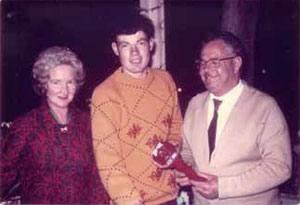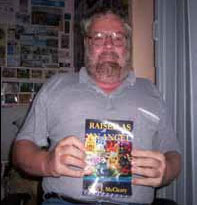Advice For New Authors
I always wanted to write books but I never did; not while I was still working as I never seemed to have the time. I’ve always enjoyed communication and I worked for 33 years as a maths/science teacher but writing was always a thing that I put on the ‘back burner’. That may not have been a bad thing though as you probably need a bit of maturity about you if you plan to write about life…and death!
Back then at age 21 I knew ‘everything’ and I certainly knew that there was no such thing as an ‘afterlife’. Why would you need an afterlife if you have all the love in the world right here and now from your family and the prospect of another 60 or 70 years of healthy life to look forward to?
But then the years start to go by and people die. After a while it starts to get quite lonely and when you look in the mirror and see your own self aging you start to wonder ‘Is this all there is?’
Many people at this point rely on religious upbringing and ‘faith’ but to me those are meaningless concepts. For me there is no such thing as ‘belief’ only knowledge and knowledge is only possible through one thing; evidence!
In mathematics you don’t take the lecturer’s word for anything and he/she doesn’t expect you to. Instead you have to be able to prove every minor detail for yourself from earlier theorems or axioms. In science no theory can ever be proven only improved on when new evidence becomes available. Nothing is set in concrete; nothing is known for certain!
Now in 1997 I came to the realisation that almost everyone and everything that I loved was now either completely non existent or existing in some other realm or soon would be. I had two choices (nothing or something) and I was unwilling to simply ‘believe’ in either one. For me evidence always has been and always will be the bottom line.
So that’s where my personal journey began and I have to say that it’s been like a run away express train ever since! What they DON’T teach you in maths/science classes or religion classes either, would fill VOLUMES!
You want evidence? Well you don’t have to look far; only as far as the internet in fact. It turns out that there are TWENTY-TWO separate areas of research which each on their own proves the existence of life after death! The most dramatic of these is the so called ‘Near Death Experience’ or NDE where a subject is resuscitated from the point of death and comes back with wonderful life changing visions of a life beyond death.
I’ve always wanted to be a writer as I said but I don’t do text books and I don’t preach at people either. I’m a story-teller but at the same time I now had this incredible body of new found knowledge that I wanted to share with people. I decided to write fictional stories but to set them in a universe based on my studies. Everyone experiences grief at some point and for me re-reading some works of my own favourite authors or watching reruns of old television shows helped enormously in the bad times so that was the motivation for writing my books.


Having now written five novels I now think I can identify some key things that you need as an author.
-
Motivation
You need a reason for your stories to exist. That need not be the same as me trying to explain some grand underlying reality. It might be that you just want to highlight some aspect of a relationship such as the love of a parent for a child. You might be the kind of person who enjoys setting puzzles for others to solve such as writing a good mystery story. For me the genre known as ‘the quest’ has always been my favourite. This is where someone embarks on a single minded adventure to solve some task or to right some wrong.
-
Now you need the characters
You need just the right individuals that will interact with each other to bring out what it is that you the author are trying to say. A story needs to have some explanation or narrative along the way but it is through the dialogue between the characters that the reader becomes engaged. You need to get to know your characters as real people so you know how they will react and what they will say to each other at various points in the story. Also if you need to introduce a complicated concept don’t try to explain too much of it to the reader as you will just end up boring them with facts. Invent a character that does that particular thing! For example he/she may be a hopeless lover and/or the butt of many jokes but they know how to do, ‘Time Travel’.
-
You need a good plausible plot!
You are after all writing a story and so it has to flow. One thing needs to logically follow from what has gone before which doesn’t always happen in everyday life. Also it’s no good saying ‘but that really happened that way to me’. It may still not seem plausible to the reader. Try to imbed seemingly unimportant little things along the way that you can later refer to. These add depth to the story.
-
Opposites are important
If you expect to get your reader emotionally involved with some degree of sadness there also at some point needs to be juxtaposition with humour. Surprisingly the two opposing concepts usually go hand in hand. Also always remember the important adage ‘no tears for the author, no tears for the reader’.
-
You need to enjoy the process of writing
For me it’s the reverse of watching a movie. Instead of the ideas flowing from the screen down into your brain they flow from your brain via the keyboard up onto the screen and the bonus is that you get to control the action. I have a friend who has years of formal training in literature but says that he finds the writing process to be the most frustrating and infuriating thing because he never gets it ‘right’ to his satisfaction and continuously feels the need to start over. If that’s the case give it away completely and do something more constructive like playing a round of golf!
-
Finally make sure you get your facts straight
When I write, a good third of my time sitting at the computer is not typing but rather researching some topic or place or whatever so that the reader feels comfortable that you know what you are talking about. If possible try to stick to things and places that you already know something about or have been to.
The Dialog is very important!
The dialog has to flow smoothly but at the same time the reader has to be clear on who is talking. Do NOT overuse (or even at all) phrases like He said…She said…then he replied… or words to that effect. This is very jarring to the reader and not at all natural. Also try to make use of contractions such as they’re rather than they are or that’s all rather than that is all. Start a new paragraph for each speaker and put their words in inverted comas. Identify the person talking by giving the reader a bit of insight into what they’re thinking. You don’t have to identify every person who is speaking if it is obvious from the order of speech or from what the person is saying. Here’s an example from my book ‘Journey to a Far Away Place’…
The girl Astrid beckoned to a group of three men who were standing nearby to join them. “These are my bothers Leif, Bjorn and Ulf.”
Each of the men was dressed in a fur vest which they wore over heavy leather trousers and boots and on their heads they wore the traditional horned Viking helmet.
The man Gunnar, who had no memory of who he was hesitatingly held out his hand to them but it was clear that the gesture was unknown to them.
Leif, who was blonde of beard and hair, was clearly the leader of the group and he offered the first greeting. “Tell me soldier, what battles have you fought and what deeds and sacrifices have you performed?”
The man gave Astrid a worried look and he was pleased when she answered for him. “This hero has fought an enemy so strong and so powerful that in defeating him he has temporarily lost his memory of
even his own name!”
The other two brothers were shorter with darker features and hair. Bjorn stepped forward to offer his greeting. “Our sister is of the Valkyries and they are never mistaken. If she has chosen you as a
hero then that is exactly what you are.”
The other brother, Ulf, being younger and somewhat rebellious wasn’t so sure. “A person with no memory could equally be a hero or a coward. I for one refuse to feast with a coward!”
Leif stepped forward and struck Ulf hard across the face with the palm of his hand. “You dishonour us all, my brother. I too do not associate with cowards but neither will you find any such individuals
at our feast here tonight. Our sister, Astrid, has brought this hero among us and he will be treated as such!”
Ulf was contrite. “I apologise to you my brother, and to the stranger also.”
My first three books form a trilogy and the fifth one ‘Journey to a Far Away Place’ is set in the same universe but is a stand alone story. This one looks at the ‘darker side’ of the afterlife as told by a small number of NDEers who come back with some rather frightening ‘hellish’ experiences. Please remember though that I do not believe in ‘Hell’ or ‘devils’ or ‘demons’ etc. Book 4 ‘A Time For Susan’ is a time travel adventure with a strong theme of love between a father and his child.
Please take a look at my website where I have gone into considerably more detail about the stories. Also I should mention that music has always been a tremendous inspiration to me in my writing and on my website under the heading Musical Links you will find some of my favourite songs many of which are mentioned in my books.
Kind regards from Gary J McCleary